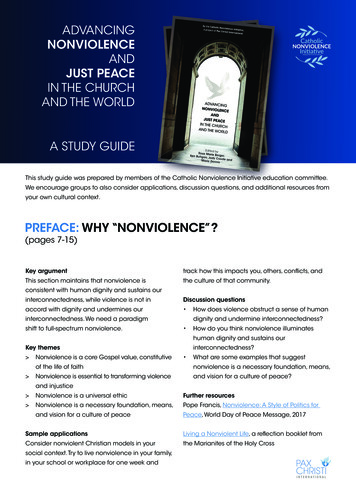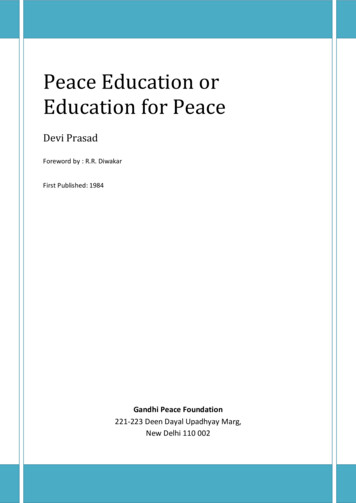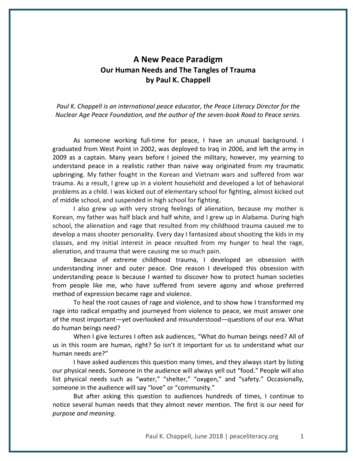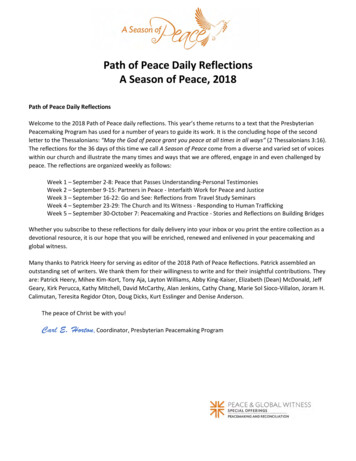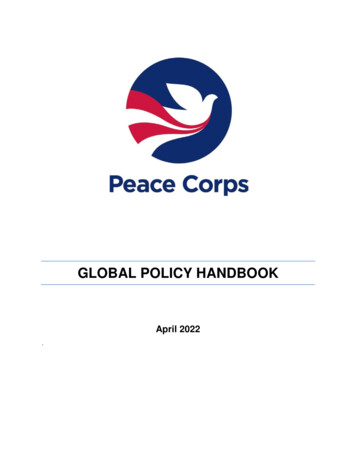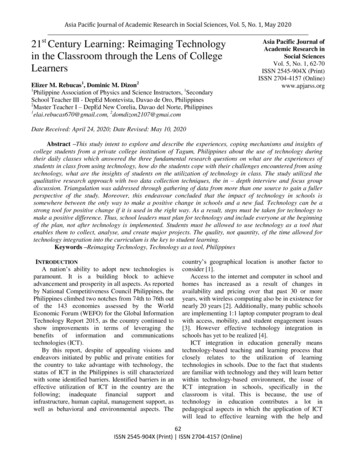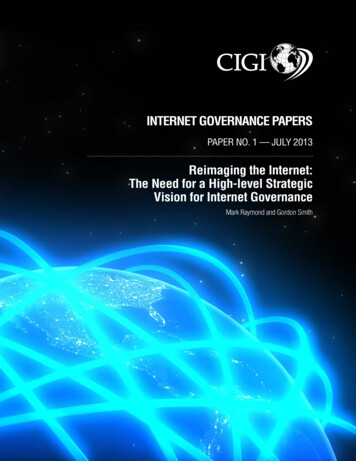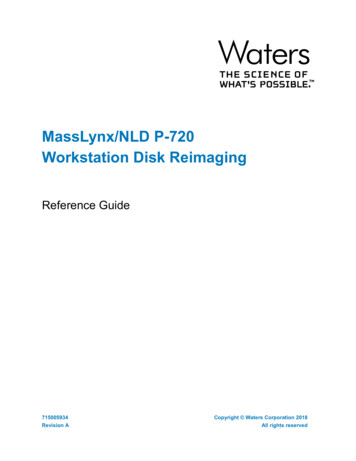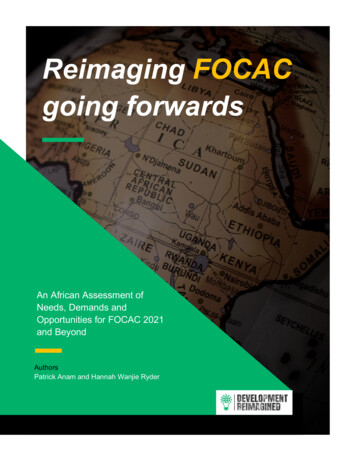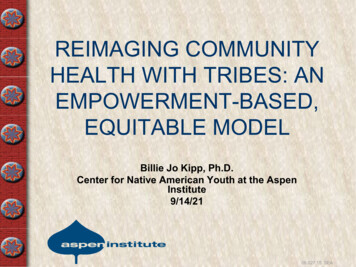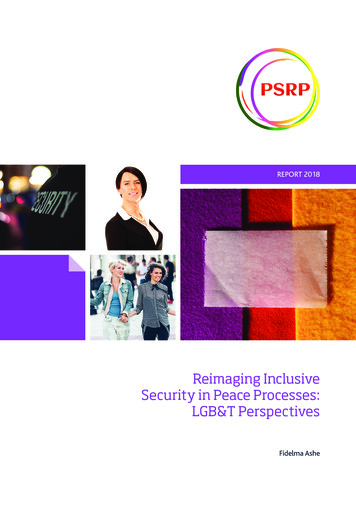
Transcription
REPORT 2018Reimaging InclusiveSecurity in Peace Processes:LGB&T PerspectivesFidelma Ashe
This research draws on the PA-X Peace Agreement Database(www.peaceagreements.org), a database of all peace agreementsat any stage of the peace process from 1990 to 2016. The databaseis fully searchable and supports both qualitative and quantitativeexamination of peace agreements. It also draws on an broader projectentitled ‘LGBTQ Visions of Peace in a Society Emerging from Conflict’funded by the AHRC through the Parntership for Conflict Crime andSecurity Aware (with Catherine Gander, Maynooth University andStefanie Lehner, Queen’s University of Belfast).Author: Fidelma AshePolitical Settlements Research Programme (PSRP)Global Justice AcademySchool of LawOld CollegeThe University of EdinburghSouth BridgeEdinburghEH8 9YLTel. 44 (0)131 651 4566Fax. 44 (0)131 650 2005E-mail: nts.org@PolSettlementsAcknowledgements: This research is an output from the PoliticalSettlements Research Programme (PSRP), funded by UK Aid from theUK Department for International Development (DFID) for the benefitof developing countries. The information and views set out in thispublication are those of the author. Nothing herein constitutes theviews of the Department. Any use of this work should acknowledgethe author and the Political Settlements Research Programme.For online use, we ask readers to link to the original resource on thePSRP website.Thanks are due to Jee-Young Song for proofreading andproduction work. 2018
ContentsKey Findings and Recommendations01LBB&T Communities and PeaceProcesses: Introduction03Inclusive Peace and Security04Research and Methodology05Findings07Institutional PrejudiceInstitutional ReformPolicing ReformParamilitaries07091011Conclusion 12Appendix: Peace Agreements Mentioned in TextAppendix: Key ResourcesAppendix: References141415
01 // Reimaging Inclusive Security in Peace Processes: LGB&T PerspectivesKey Findings and RecommendationsThis report finds:]In deeply divided societies, political negotiations and accords to address violent conflictoften address historical grievances surrounding ethno-nationalist, political, social andcultural inequalities. Grievances relating to other identities are often side-lined asresidual matters in terms of making and building peace.]The level of insecurity experienced by sexual and gender minorities is impacteddirectly by both ethno-nationalism and overt political conflict. Inclusive approachesto conflict transformation will include analysis and practices which seek to affectthe security of multiple identity groups, including Lesbian, Gay, Bi-sexual andTransgender (LGB&T) communities.]By moving beyond statist interpretations of security, analysts and policymakerscreate conceptual space to challenge the persistence of ethno-sexual and ethno-genderinsecurities in transitional societies.]Framing LGB&T security within a universal human rights agenda underscores LGB&Tpeople’s fundamental right to security. However, human rights approaches canunderplay the relationship between LGB&T insecurities and the legacies of conflict.Contextualising LGB&T insecurities within a conflict framework can inform analyticaland policy approaches to reimagining what the human right to security means intransitioning societies.]Statist interpretations of security limit understandings of the sources of insecurity inconflict-affected states. LGB&T articulations of insecurity should guide both policy andpractice in transitional societies; advocacy groups should have access to policymakersand a broad range of LGB&T groups should be appropriately resourced to address allaspects of their constituencies’ security needs during peacebuilding.]LGB&T insecurity cannot be addressed solely through policy and legal change. Civilsociety organisations can play a role in preserving forms of LGB&T insecurity duringconflict; consequently, they can play a central role in reducing forms of LGB&Tinsecurity during the conflict transformational period.
Reimaging Inclusive Security in Peace Processes: LGB&T Perspectives // 02]Policing reform in transitional societies must fully address LGB&T security. If historicallylow-levels of confidence and trust between sexual and gender minorities pertain,and the police are a key institution for reform, re-building trust with a range ofconstituencies, including LGB&T constituencies must be addressed throughinstitutional change and monitoring.]The media have a duty to move beyond debates concerning the ‘morality’ of legalchanges designed to dismantle the sexual and gender inequalities of the past.The media can play an important role in terms of exposing the effects of thepersistence of those historical inequalities on the security of LGB&T people inconflict-affected states.
03 // Reimaging Inclusive Security in Peace Processes: LGB&T PerspectivesLGB&T Communities andPeace Processes; Introduction1In deeply divided societies, political negotiations and accords focus on addressing thehistorical grievances surrounding ethno-nationalist political, social and cultural inequalities.As societies begin the transitional process, the grievances of other identities are often sidelined as residual matters in terms of making and building the peace. The marginalisation ofwomen from peacebuilding and the failure of conflict transformation to adequately addressgendered inequalities have received much critical attention from feminists. Those criticalgendered engagements provide useful frameworks for examining the marginalisationof sexual and gender minorities from conflict transformational frameworks; a site ofanalysis that has only recently emerged. Moreover, feminist interrogations of conflicttransformation expose the exclusions created by statist conceptions of security that toooften frame security as the absence of political violence. Therefore, the exclusion of LGB&Tinsecurities from statist conceptions of security emerges due to the limited way that thestate and policymakers frame violence.However, ethno-nationalist conflict can strengthen historical prejudices and inequitiessurrounding sexuality and gender identity creating insecurity and other forms of harm.These prejudices and inequities often permeate the conflict transformational period,which means that the harms of the past persist in the present. Consequently, both politicalconflict and processes of conflict transformation shape homophobia and transphobia.LGB&T security is therefore directly linked to political conflict.Placing LGB&T equality issues within a conflict transformational framework, the authorconducted 14 focus groups with LGB&T friendship and support groups in Northern Ireland.The focus groups explored the effects of conflict transformation on LGB&T equality inthe region. The findings exposed that a range of sexual and gendered inequalities havepersisted at macro, meso and micro-levels during Northern Ireland’s transition fromconflict facilitated by the 1998 Peace Agreement (Northern Ireland, The Agreement reachedin the multi-party negotiations (Good Friday Agreement), 10 April 1998). Security – ormore accurately insecurity – became a persistent theme during the series of focus groupdiscussions. This report draws on this data to consider the relationship between LGB&Tequality and one of the core objectives of conflict transformation, the cessation orreduction of levels of societal violence.1The study participants identified as Lesbian, Gay, Bi-sexual or Transgendered. There were no intersexed peoplein the sample.
Reimaging Inclusive Security in Peace Processes: LGB&T Perspectives // 04Inclusive Peace and SecurityFeminist research has exposed how gendered and sexual narratives and practices shapeethno-nationalist conflict. Ethno-gendered and ethno-sexual narratives often frame thebroader values and distinctive culture of the ethno-nationalist group to produce a set ofpatriarchal and heteronormative ideals (see e.g. Mayer, 2000; McClintock, 1995; Nagel,2000; Ní Aoláin, 2016). These ideals regulate gender and sexual subjects into identities andpractices that reflect and signify broader ethno-nationalist visions of the nation. The morepervasive this social regulation becomes, the more it erodes and diminishes the bodilyautonomy of gendered and sexual subjects.Those who do not conform to ethno-nationalism’s normative scripts by, for example,fashioning their own autonomous sexual and gendered scripts can become subject not onlyto forms of social disapproval, but additionally subject to forms of physical punishment.Indeed, some commentators have argued that the broader culture of violence in deeplydivided societies can encourage violent responses towards members of gendered and sexualminorities that transgress ethno-nationalist norms (see Kitchin, 2002).Consequently, the level of insecurity experienced by sexual and gender minoritiesis impacted directly by both ethno-nationalism and overt political conflict. Duringconflict transformation, reducing and preventing political violence becomes the focus ofpeacebuilders. Less, if any, attention is paid to the effects of political conflict on violencedirected at identities that cut across ethno-nationalist identifications. Invariably, hierarchiesof violence emerge as the reduction of levels of violence between ethno-nationalistgroups is prioritized, and other forms of violence are viewed as residual issues in termsof transforming conflict (see Hillyard, McWilliams and Ward, 2006). The PSRP report byMcWilliams and Doyle (2017) on intimate partner violence in peacebuilding societies isinstructive in terms of exposing the value-systems that maintain a hierarchical ordering ofviolence during transition. An inclusive peace will increase security for a range of identities,and an inclusive approach to analysing the outcomes of conflict transformation will includeanalyses of how conflict transformation affects the security of multiple identity groups.
05 // Reimaging Inclusive Security in Peace Processes: LGB&T PerspectivesResearch and MethodologyThis report draws on focus group research conducted by the author as part of a broaderproject conducted with colleagues Catherine Gander (Maynooth) and Stefanie Lehner(QUB), titled ‘LGBTQ Visions of Peace in a Society Emerging from Conflict’, that was fundedby the AHRC through a Partnership for Conflict Crime and Security Award.2 The projectsought to facilitate the inclusion and participation of LGB&T people in peacebuildingthrough blending social science and creative arts methodologies. The project hosted aseries of focus groups with LGB&T people that were followed by a set of photographic andtheatre workshops that led to a photography exhibition and a touring theatre play thatreflected the themes of the project.The focus group research commenced in August 2016 and the final group was held inFebruary 2017. Group discussions explored issues of LGB&T 3 inclusion and equality beforeand after the Northern Ireland peace accord in 1998. The Focus Identity Trust, GenderIdentity Ireland and the Rainbow Project facilitated the focus group research by providingthe researcher with access to LGB&T and transgender friendship and support groupslocated in South Belfast, North Belfast, Enniskillen, Omagh and the Foyle area (Ashe,2018). Some of the friendship and support groups that participated in the focus groupsessions had low membership due to fears surrounding the disclosure of identity throughattendance. In addition, some organisers attributed low-levels of membership to a lackof investment in LGB&T support groups by local government and the Northern IrelandAssembly.2Further information on the project can be found at: -conflict/ (Accessed 19 January 2018).3Further information on the project can be found at: http://www.ahrc.ac.uk/research/fundedtheme.
Reimaging Inclusive Security in Peace Processes: LGB&T Perspectives // 06Between 1-5 focus groups were conducted with each regional support/friendship group.The focus groups were conducted in community centres or local offices and lastedapproximately 90 minutes, with double sessions lasting approximately 180 minutes.The researcher utilised a semi-structured focus group schedule of questions to explore5 themes with each group, displayed in the table below:Thematic area 1Dominant and subjugated perspectives on peace.Thematic area 2Inclusion/exclusion before 1998.Thematic area 3Inclusion and exclusion after 1998.Thematic area 4The role of the institutions established or reformed after 1998in creating inclusion\exclusion.Thematic area 5Visions of a positive peace.Collectively, the focus groups recorded the responses of 20 participants to explorations of5 thematic areas. Due to the regional coverage, there was a mix of protestant and catholicparticipants. The age range of the participants was early 20s to 70 .
07 // Reimaging Inclusive Security in Peace Processes: LGB&T PerspectivesFindingsParticipants agreed that social attitudes had improved since the 1998 Northern IrelandPeace Agreement towards Lesbian, Gay and Bisexual (LGB) people, but felt there had beenless improvement in attitudes towards transgender people. There was broad agreementacross the focus groups that it was virtually impossible to disclose LGB&T identities duringthe conflict due to high levels of social prejudice and general fears about the implicationsof disclosure for personal security. Across the groups participants argued that many peopleleft Northern Ireland due to high levels of prejudice, even after sex between men over21 became legal in Northern Ireland in 1982. Collectively, participants listed the sourcesof prejudice and fear during the conflict as the churches, particular members of politicalparties, education, welfare agencies, paramilitary groups and the (then) Royal UlsterConstabulary (RUC).Sources of Insecurity during peace buildingInstitutional Prejudice:Participants argued that after 1998, social institutions and social organisations had failedto address prejudice against LGB&T people, and some had even continued to reinforceprejudice; many remain highly conservative and highly masculinised (see Ashe, 2012;Ashe and Harland 2014). Several of these organisations and institutions, which includedpublic institutions, workplaces, the churches, and the police force, had supported orengaged in practices of building equality and parity of esteem between ethno-nationalistgroups during conflict transformation. Indeed some, such as the churches, continue to beassociated with different forms of peacebuilding in Northern Ireland including practices ofreconciliation.However, in relation to the LGB&T population, participants argued that these socialinstitutions often contributed to the high levels of insecurity that LGB&T people hadexperienced during conflict transformation. For example, those in secondary schooling after1998 experienced significant levels of homophobic and transphobic prejudice. Transgenderparticipants detailed the extreme levels of anxiety they had experienced when faced withwelfare agencies, which included the fear of losing custody of their children. Disclosingidentities in the workplace was still an area of concern for participants across theregional groups.
Reimaging Inclusive Security in Peace Processes: LGB&T Perspectives // 08The churches and particular political parties were viewed as hostile to LGB&T people, whichdid little to challenge wider societal prejudice and forms of social exclusion. The NorthernIreland Assembly, the devolved institution tasked with operationalising the peace process,was considered an impediment to progressing equality in the area of sexual orientation bya number of the focus groups. The groups argued that the Assembly awarded low priorityto sexual equality, which combined with the DUP’s use of the ‘petition of concern’ to blockequality legalisation,4 creating a hostile political climate wherein advancing the rights ofsexual minorities would remain challenging. However, transgender groups believed thatit was important to try to keep working with all types of constituencies to educate andadvance their claims for equality.The focus groups believed that the persistence of social conservatism during conflicttransformation created fears surrounding the disclosure of LGB&T identities. During theconflict people hid their identities, but during the peace process many continued to assessthe levels of risks in terms of disclosing their sexuality or gender identity to particularindividuals, groups or institutions. The participants in the focus groups drew a picture ofLGB&T people oscillating between disclosure and concealment of their identities.For example, people may disclose their identities to family and friends but conceal themfrom teachers, employers or welfare agencies. There were high levels of fear in terms ofshowing affection to same sex partners in public even in urban areas which tend to beviewed as providing a more liberal environment for LGB&T people in Northern Ireland.Insecurity in public places is heightened for transgender women who may not be able toconceal their identities as easily as other sexual and gender minorities. Reports of physicalattacks or the harassment of LGB&T people in local areas increased fears of furtherharassment and attack and could lead to practices of hyper-vigilance especially in publicand unfamiliar places.4Section 75 places a duty on public authorities to have due regard for groups with protected characteristics andrequires those authorities to undertake monitoring of the workforce and consultation on changes that may affectthe equality of protected groups. See on/75(Accessed 25 January 2018).
09 // Reimaging Inclusive Security in Peace Processes: LGB&T PerspectivesInstitutional Reform:The equality provisions ushered in by the Agreement, for example section 75 5 of theNorthern Ireland Act (1998) which included sexuality and gender identity as protectedcharacteristics for the purposes of equality monitoring, were viewed as weak by theparticipants and easily subverted. Under Section 75, public authorities, when carrying outtheir functions, must promote equality of opportunity for protected groups. Participantsargued that there were still deep pockets of prejudice in some public-sector organisations.For example, a woman who applied for a public-sector job recalled the reaction of theinterview panel when she mentioned the skills she had developed working as a co-ordinatorof an LGB&T friendship group. She claimed that the tone of the interview changed afterthe disclosure of her work as a LGB&T activist. She felt that that the disclosure had ‘costher the job’. In addition, participants explained that most application forms request detailsof the school where qualifications were gained. If a transgender man, for example, went toa single-sex secondary school then the naming of the school on the application form, ineffect, discloses his gender identity.Participants believed that section 75 offered little protection from discrimination inemployment because recruitment and selection processes in public sector institutionswere still affected by prejudices towards LGB&T people. They recognised that the NorthernIreland Equality Commission and the Human Rights Commission, which was a productof the 1998 Agreement, had attempted to protect and advance LGB&T rights, but thefocus groups believed these institutions could not effectively address the range or depthof the insecurities that they experienced in everyday life. Moreover, they viewed taking alegal case of discrimination against an employer as both complex and difficult. Barriers tosecuring and maintaining employment created economic insecurities for many of the studyparticipants. They worried that they would not be able to keep their sexual orientationor gender identity private which might lead to prejudice in the workplace that wouldeventually force them to resign. Others, especially transgender participants feared thatthey would never be able to secure a living wage due to their gender identity.5Section 75 of the Northern Ireland Act 1998 places a duty on public authorities to have due regard for groups withprotected characteristics and requires those authorities to undertake monitoring of the workforce and consultationon changes that may affect the equality of protected groups. See: on/75 (Accessed 25 January 2018).
Reimaging Inclusive Security in Peace Processes: LGB&T Perspectives // 10Policing Reform:Policing has been an exceptionally complex issue in Northern Ireland. The police force, theRoyal Ulster Constabulary (RUC) which also operated as a counter-insurgency force duringthe conflict was overwhelmingly protestant in composition and was perceived as a partialand prejudiced force by the Catholic community (see Ryder, 2004). After 1998, the policeforce underwent significant reforms, which included the inclusion of more Catholics, andto a lesser extent more women. The RUC was also renamed and rebranded as the PoliceService of Northern Ireland (PSNI). Participants who had experience or historical memoriesof the RUC viewed its replacement by the PSNI as improving policing outcomes forLGB&T people.As the RUC had been charged with enforcing ‘anti-gay’ laws in the period before theestablishment of LGB&T legal protections this finding is not surprising. Currently, the PSNIis legally charged with protecting the security of LGB&T people. However, focus groupdata indicated that historical memories and perceptions of policing during the conflictcontinue to shape LGB&T people’s contemporary perceptions. During the conflict, thehistorical relationship between the police force and LGB&T people resulted in deep distrust.Older focus group participants who had experienced the conflict lacked confidence in thecontemporary police force. Interestingly, when asked about their perceptions of policing,focus group participants in the 20 to 30 year old category regularly set the problems theyidentified in contemporary policing within a broader historical framework that included theperiod of the conflict. Older participants argued that younger LGB&T people had inheritedtheir deep distrust of the police because those younger people were very aware of thehistorical relations between the police in Northern Ireland and the LGB&T identity groups.
11 // Reimaging Inclusive Security in Peace Processes: LGB&T PerspectivesThe research data suggested that the history of policing in the region increased theprospect of negative experiences of the PSNI being interpreted as evidence of thepersistence of institutional bias against LGB&T people in the police force. In general,focus group participants felt that LGB&T people did not have parity of esteem in termsof policing priorities and processes. Participants exhibited low-levels of confidence in thepolice force. When asked if they would report homophobic or transphobic incidences orcrimes to the PSNI, the participants responded that they would be concerned about howthey would be treated during the reporting and investigation of the incidence or crime.The majority of participants believed that ‘nothing would be done’ as the police servicewould not take those types of incidence or crime seriously (see also Jarman 2012). Asbelow, the decision of some respondents to turn to armed groups to reduce insecurityreflects these perceptions.Paramilitaries:While Northern Ireland underwent processes of demilitarisation, a number of armed groupscontinued to operate at local levels and persisted in using forms of informal communityjustice including beatings and shootings (see Ashe, 2009; 2012; 2015). Participants wholived in working class areas had divergent perceptions of the effects of the persistence ofparamilitary groups during conflict transformation on LGB&T security. Three participantsindicated that given the issues surrounding the ability of the police force to providesecurity, they either would ‘seek protection’ or had been guaranteed protection fromtransphobia in their community from paramilitaries. In general, LGB participants feltparamilitary groups were not interested in sexual orientation. However, two participantsexhibited extreme levels of fear that their sexual orientation would become disclosed tothe local paramilitary group. The fragmented nature of paramilitary groups in both ethnonationalist communities explains variations in participants’ perception of those groups.
Reimaging Inclusive Security in Peace Processes: LGB&T Perspectives // 12Conclusion: Inclusive Peace and SecurityLGB&T insecurity in conflict transitional societies is not simply an expression of globalprejudices against LGB&T. LGB&T inequalities and insecurities are shaped by conflict andconflict transformational processes. Few peace processes have addressed inclusion ofgender and sexual minorities, although some processes notably have: between 1990 and2016, 10 agreements mentioned issues of sexual orientation. Three of these referencesare negative, ‘prohibiting’ or otherwise restricting same-sex relationships (Burundi 2005,Democratic Republic of Congo 2003, and Zimbabwe 2013), and seven provide for someform of affirmation or protection of equality on grounds of sexual orientation (Colombia(several agreements including 2016), Northern Ireland (1998), Nepal (2015) and Philippines(1998), and South Africa (1993).6 Both positive and negative provision indicates the ways inwhich issues of sexual orientation can come to the fore with relation to wider discussionsover inclusion and the peace process.If peace is to deliver security for LGB&T communities, and indeed provide for an inclusiveapproach to security more generally, it is important for analysts to challenge statistinterpretations of security and reimagine security as including different forms of power anddifferent models of human insecurity. While peace processes can usher in new narratives,laws and institutions that encompass the equality concerns of a range of identities (as wasthe case in Northern Ireland), forms of insecurity reinforced by the conflict persist. In orderto challenge and ameliorate the effects of those insecurities progressive elements in civilsociety and state institutions must address the inequities of the past and their persistencein the present. For example, progressives within the churches can play a significant role indeveloping forms of LGB&T inclusion. Church services for LGB&T people were viewed asvery important in terms of building inclusive practices at the level of civil society.6See PA-X Peace Agreement Database at www.peaceagreements.org, and the Appendix for links.
13 // Reimaging Inclusive Security in Peace Processes: LGB&T PerspectivesThe Northern Ireland case study suggests that institutional and legal reform duringconflict transformation can support some incremental progress on LGB&T rights, whichis reflected in Section 75 of the Northern Ireland Act (1998). However, deeper transitionsregarding LGB&T insecurity will require the appropriate resourcing of LGB&T activists andorganisations, and the opening of multiple points of access to policymakers. The media cansupport these deeper transitions by moving away from debating formats that pit LGB&Tadvocates against conservative commentators – as has been too often the case in NorthernIreland – towards critical coverage of the effects of the prejudice and hostility LGB&Tpeople experience in transitioning societies. Similarly, reform of policing to raise levels ofconfidence in the police service after conflict combined with an increase in the number ofsuccessful prosecutions for transphobic and homophobic hate crime is essential in terms ofincreasing the security of sexual and gender minorities. Again, policing requires appropriateresourcing to achieve these goals.
Reimaging Inclusive Security in Peace Processes: LGB&T Perspectives // 14Peace Agreements Mentioned in TextNorthern Ireland/Ireland/United Kingdom, The Agreement reached in the multi-partynegotiations (Good Friday Agreement or Belfast Agreement), 10 April 1998.] Available at: https://peaceagreements.org/view/556/Key ResourcesPeace AgreementsFor full text of peace agreements cited from which data in this report is drawn, andsearchable provision on economic power-sharing see: PA-X Peace Agreements Database,University of Edinburgh (www.peaceagreements.org). This database is a repository ofpeace agreements from 1990 to date, current until 1 January 2016. It contains over 1500agreements from over 140 processes with coding provisions for 225 substantive categories.For peace agreement texts with search functions see further:]Language of Peace, University of Cambridge (https://www.languageofpeace.org/#/)This tool provides access to over 1000 agreements for mediators and drafters to be ableto compare and collate language on key issues.]Peace Agreements Digital Collection, United States Institute for ace-agreements-digital-collection)This collection strives to contain the full-text agreements signed by the major contendingparties ending inter and intra-state conflicts worldwide since 1989. It was last updatedin 2009.]Peacemaker, United Nations (http://peacemaker.un.org/)Peacemaker maintains a comprehensive database of agreement texts, and it serves as anonline mediation support tool.
15 // Reimaging Inclusive Security in Peace Processes: LGB&T PerspectivesReferencesAshe, F., 2009. From Paramilitaries to Peacemakers: The Gender Dynamics of Community-Based Restorative Justice inNorthern Ireland. British Journal of Politics and International Relations, 11 (2), pp.298-314.Ashe, F., 2012. Gendering War and Pe
Reimaging Inclusive Security in Peace Processes: LGB&T Perspectives // 02] Policing reform in transitional societies must fully address LGB&T security. If historically low-levels of confidence and trust between sexual and gender minorities pertain, and the police are a key institution for reform, re-building trust with a range of
